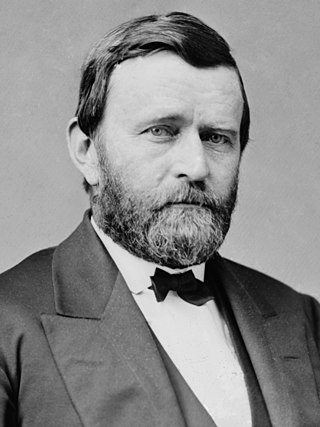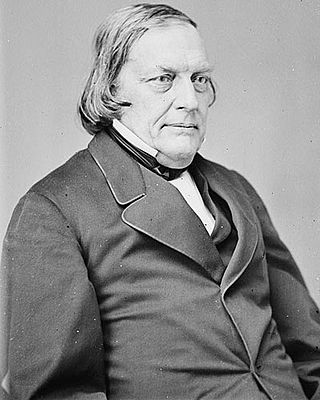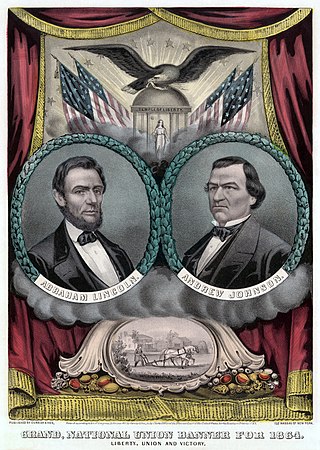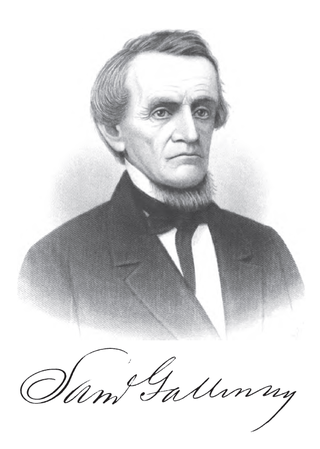
The 1860 United States presidential election was the 19th quadrennial presidential election, held on Tuesday, November 6, 1860. In a four-way contest, the Republican Party ticket of Abraham Lincoln and Hannibal Hamlin, absent from the ballot in ten slave states, won a national popular plurality, a popular majority in the North where states already had abolished slavery, and a national electoral majority comprising only Northern electoral votes. Lincoln's election thus served as the main catalyst of the states that would become the Confederacy seceding from the Union. This marked the first time that a Republican was elected president. It was also the first presidential election in which both major party candidates were registered in the same home state; the others have been in 1904, 1920, 1940, 1944, and 2016.

The 1868 United States presidential election was the 21st quadrennial presidential election, held on Tuesday, November 3, 1868. In the first election of the Reconstruction Era, Republican nominee Ulysses S. Grant defeated Horatio Seymour of the Democratic Party. It was the first presidential election to take place after the conclusion of the American Civil War and the abolition of slavery. It was the first election in which African Americans could vote in the reconstructed Southern states, in accordance with the First Reconstruction Act.

Richard Wigginton Thompson was an American politician.
The Radical Republicans were a faction within the Republican Party originating from the party's founding in 1854—some six years before the Civil War—until the Compromise of 1877, which effectively ended Reconstruction. They called themselves "Radicals" because of their goal of immediate, complete, and permanent eradication of slavery in the United States. They were opposed during the war by the Moderate Republicans, and by the Democratic Party. Radicals led efforts after the war to establish civil rights for former slaves and fully implement emancipation. After unsuccessful measures in 1866 resulted in violence against former slaves in the rebel states, Radicals pushed the Fourteenth Amendment for statutory protections through Congress. They opposed allowing ex-Confederate officers to retake political power in the Southern U.S., and emphasized equality, civil rights and voting rights for the "freedmen", i.e., former slaves who had been freed during or after the Civil War by the Emancipation Proclamation and the Thirteenth Amendment.

Galusha Aaron Grow was an American politician, lawyer, writer and businessman, who served as 24th Speaker of the U.S. House of Representatives from 1861 to 1863. Elected as a Democrat in the 1850 congressional elections, he switched to the newly organized Republican Party in the mid-1850s when the Democratic Party tried to force the extension of slavery into western territories.

William Pitt Fessenden was an American politician from the U.S. state of Maine. Fessenden was a Whig and member of the Fessenden political family. He served in the United States House of Representatives and Senate before becoming Secretary of the Treasury under President Abraham Lincoln during the American Civil War. Fessenden then re-entered the Senate, where he died in office in 1869.

The Constitutional Union Party was a United States third party active during the 1860 elections. It consisted of conservative former Whigs, largely from the Southern United States, who wanted to avoid secession over the slavery issue and refused to join either the Republican Party or the Democratic Party. The Constitutional Union Party campaigned on a simple platform "to recognize no political principle other than the Constitution of the country, the Union of the states, and the Enforcement of the Laws".

The 1860 Republican National Convention was a presidential nominating convention that met May 16–18 in Chicago, Illinois. It was held to nominate the Republican Party's candidates for president and vice president in the 1860 election. The convention selected former representative Abraham Lincoln of Illinois for president and Senator Hannibal Hamlin of Maine for vice president.

Alexander Hugh Holmes Stuart was a prominent Virginia lawyer and American political figure associated with several political parties. Stuart served in both houses of the Virginia General Assembly, as a U.S. Congressman (1841–1843), and as the Secretary of the Interior (1850–1853). Despite opposing Virginia's secession and holding no office after finishing his term in the Virginia Senate during the American Civil War, after the war he was denied a seat in Congress. Stuart led the Committee of Nine, which attempted to reverse the changes brought by Reconstruction. He also served as rector of the University of Virginia.

The 1860 Democratic National Conventions were a series of presidential nominating conventions held to nominate the Democratic Party's candidates for president and vice president in the 1860 election. The first convention, held from April 23 to May 3 in Charleston, South Carolina, failed to nominate a ticket, while two subsequent conventions, both held in Baltimore, Maryland in June, nominated two separate presidential tickets.

William Lewis Dayton was an American politician, active first in the Whig Party and later in the Republican Party. In the 1856 presidential election, he became the first Republican vice-presidential nominee when nominated alongside John C. Frémont. The Republican Party lost that campaign. During the American Civil War, Dayton served as the United States Ambassador to France, a position in which he worked to prevent French recognition of the Confederate States of America.

Ira Harris was an American jurist and senator from New York. He was also a friend of Abraham Lincoln.

The 1856 Republican National Convention was a presidential nominating convention that met from June 17 to June 19, 1856, at Musical Fund Hall at 808 Locust Street in Philadelphia, Pennsylvania. It was the first national nominating convention of the Republican Party, founded two years earlier in 1854. It was held to nominate the party's candidates for president and vice president in the 1856 election. The convention selected former John C. Frémont, a United States Senator from California, for president, and former Senator William L. Dayton of New Jersey for vice president. The convention also appointed members of the newly established Republican National Committee.

The National Union Party was the name used by the Republican Party and elements of other parties for the national ticket in the 1864 presidential election during the Civil War. Most state Republican parties did not change their name. The name was used to attract War Democrats, border state voters, and Unconditional Unionist, and Unionist Party members who might otherwise have not voted for Republicans. The National Union Party nominated incumbent Republican President Abraham Lincoln of Illinois and Democrat Andrew Johnson of Tennessee for Vice President. They won the Electoral College 212–21.

Samuel Galloway was a U.S. Representative from Ohio.

Harris Merrill Plaisted was an attorney, politician, and Union Army officer from Maine. As colonel, he commanded the 11th Maine Volunteer Infantry Regiment during the American Civil War. After the war, he served as Maine Attorney General, a U.S. Congressman, and the 38th Governor of Maine.

John Curtiss Underwood was an attorney, abolitionist politician and a United States district judge of the United States District Court for the District of Virginia and the United States District Court for the Eastern District of Virginia.
The 1861 United States Senate election in New York was held on February 5, 1861, by the New York State Legislature to elect a U.S. Senator to represent the State of New York in the United States Senate.
For the political leader in Florida see John Pease Sanderson
This article documents the political career of Abraham Lincoln from the end of his term in the United States House of Representatives in March 1849 to the beginning of his first term as President of the United States in March 1861.
















